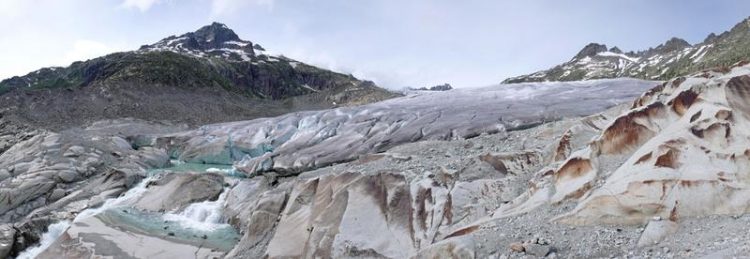Glaciers melt faster than ever

Rhone Glacier, June 2007 Simon Oberli
The World Glacier Monitoring Service, domiciled at the University of Zurich, has compiled worldwide data on glacier changes for more than 120 years. Together with its National Correspondents in more than 30 countries, the international service just published a new comprehensive analysis of global glacier changes in the Journal of Glaciology.
In this study, observations of the first decade of the 21st century (2001-2010) were compared to all available earlier data from in-situ, air-borne, and satellite-borne observations as well as to reconstructions from pictorial and written sources.
«The observed glaciers currently lose between half a metre and one metre of its ice thickness every year – this is two to three times more than the corresponding average of the 20th century», explains Michael Zemp, Director of the World Glacier Monitoring Service and lead author of the study.
«Exact measurements of this ice loss are reported from a few hundred glaciers only. However, these results are qualitatively confirmed from field and satellite-based observations for tens of thousands of glaciers around the world.»
Global glacier decline
According to the international author team, the current rate of glacier melt is without precedence at global scale, at least for the time period observed and probably also for recorded history, as indicated also in reconstructions from written and illustrated documents. In addition, the study shows that the long-term retreat of glacier tongues is a global phenomenon.
Intermittent re‐advance periods at regional and decadal scales are normally restricted to a subsample of glaciers and have not come close to achieving the Little Ice Age maximum positions reached between the 16th and 19th century. As such, glacier tongues in Norway have retreated by some kilometres from its maximum extents in the 19th century. The intermittent re-advances of the 1990s were restricted to glaciers in the coastal area and to a few hundred metres.
In addition, the study indicates that the intense ice loss of the past two decades has resulted in a strong imbalance of glaciers in many regions of the world. «These glaciers will suffer further ice loss, even if climate remains stable», explains Michael Zemp.
The World Glacier Monitoring Service, with the support of its National Correspondents, compiles the results of worldwide glacier observations in annual calls-for-data. The current database contains more than 5,000 measurements of glacier volume and mass changes since 1850 and more than 42,000 front variations from observations and reconstructions reaching back to the 16th century. The international service is hosted at the Department of Geography of the University of Zurich, is co-financed by the Federal Office of Meteorology and Climatology MeteoSwiss within the framework of GCOS Switzerland, and works under the auspices of several international organizations: http://www.wgms.ch
Literatur:
Zemp, Michael, Frey, H., Gärtner-Roer, I., Nussbaumer, S.U., Hoelzle, M., Paul, F., Haeberli, W., Denzinger, F., Ahlstroem, A.P., Anderson, B., Bajracharya, S., Baroni, C., Braun, L.N., Caceres, B.E., Casassa, G., Cobos, G., Davila, L.R., Delgado Granados, H., Demuth, M.N., Espizua, L., Fischer, A., Fujita, K., Gadek, B., Ghazanfar, A., Hagen, J.O., Holmlund, P., Karimi, N., Li, Z., Pelto, M., Pitte, P., Popovnin, V.V., Portocarrero, C.A., Prinz, R., Sangewar, C.V., Severskiy, I., Sigurdsson, O., Soruco, A., Usubaliev, R., and Vincent, C. (2015): Historically unprecedented global glacier decline in the early 21st century. Journal of Glaciology.
Doi: 10.3189/2015JoG15J017 [URL: http://dx.doi.org/10.3189/2015JoG15J017]
Kontakt:
Michael Zemp
World Glacier Monitoring Service
Department of Geography
University of Zurich
Tel. 0041 44 635 51 39
E-Mail: michael.zemp@geo.uzh.ch
Beat Müller
Media Relations
University of Zurich
Tel. +41 44 634 44 32
E-Mail: beat.mueller@kommunikation.uzh.ch
National Correspondents of the World Glacier Monitoring Service: http://wgms.ch/nc.html
Media Contact
All latest news from the category: Earth Sciences
Earth Sciences (also referred to as Geosciences), which deals with basic issues surrounding our planet, plays a vital role in the area of energy and raw materials supply.
Earth Sciences comprises subjects such as geology, geography, geological informatics, paleontology, mineralogy, petrography, crystallography, geophysics, geodesy, glaciology, cartography, photogrammetry, meteorology and seismology, early-warning systems, earthquake research and polar research.
Newest articles

First-of-its-kind study uses remote sensing to monitor plastic debris in rivers and lakes
Remote sensing creates a cost-effective solution to monitoring plastic pollution. A first-of-its-kind study from researchers at the University of Minnesota Twin Cities shows how remote sensing can help monitor and…

Laser-based artificial neuron mimics nerve cell functions at lightning speed
With a processing speed a billion times faster than nature, chip-based laser neuron could help advance AI tasks such as pattern recognition and sequence prediction. Researchers have developed a laser-based…

Optimising the processing of plastic waste
Just one look in the yellow bin reveals a colourful jumble of different types of plastic. However, the purer and more uniform plastic waste is, the easier it is to…



